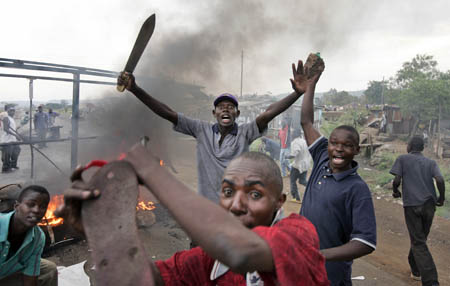
In this Monday, Jan. 28, 2008 file photo, Kenyan men from the Luo tribe armed with machetes and rocks enforce a makeshift roadblock, searching passing vehicles for Kikuyus trying to flee the town in order to kill them, during post-election violence on the main road to the Ugandan border near the airport in Kisumu, Kenya. Kenya’s foreign minister Amina Mohamed said at a news conference Wednesday, Oct. 9, 2013 that no sitting president in the world has had to appear before a court, a statement that comes as Kenya appears to be laying the groundwork to avoid having President Uhuru Kenyatta appear at the International Criminal Court next month. (AP Photo / Ben Curtis, File)
ADDIS ABABA, Ethiopia (AP) — African leaders should not allow the International Criminal Court to continue treating Africans “in a condescending manner,” an African Union official said Friday during the start of a meeting to discuss the continent’s relationship with the court.
Far from promoting justice and peace, the ICC has become a political tool used to target Africans, said Tedros Adhanom Ghebreyesus, the chairman of the Executive Council of the African Union and Ethiopia’s foreign minister.
The ICC has also come under strong criticism from other African leaders. The international court has indicted only Africans so far.
Foreign ministers met Friday at AU headquarters in Ethiopia to deliberate the continent’s relationship with The Hague, Netherlands-based court. African heads of state and government meet on the issue Saturday.
“This unfair and unjust treatment is totally unacceptable and that’s why we have been expressing serious concerns against the ICC,” Tedros said.
Tedros said the AU’s concerns about the fair treatment of Africa have been ignored. The request to the United Nations Security Council to defer the ICC proceedings against Sudan President Omar al-Bashir — who is wanted by the ICC for war crimes — has neither been heard or acted upon, Tedros said
The ICC also rejected the AU’s request for postponement of the ICC investigation and prosecution of Kenyan leaders suspected of instigating the postelection violence.
President Uhuru Kenyatta faces crimes against humanity charges for Kenya’s 2007-08 postelection violence in which more than 1,000 people died. His trial starts next month.
Kenya’s Deputy President William Ruto and broadcaster Joshua Sang also have been charged with crimes against humanity. Their trials, which began last month, continued Friday.
Kenya’s parliament last month voted to withdraw from the ICC. Kenya requested the convening of the special summit, Tedros said.
In the build-up to the summit political insiders in Kenya’s government have said that African countries may decide to sever ties with the ICC in solidarity with Kenya. Uganda’s Deputy Foreign Minister Okello Oryem said recently that Uganda would be compelled to quit the Rome Statute that created the ICC court if a “summit-level” recommendation is made.
Kenya Foreign Minister Amina Mohammed denied that Africa is trying cut ties with the ICC and said that the continent, whose countries make most of members of the ICC, wants its concerns heard.
Any withdrawal from the ICC would send the wrong signal about Africa’s commitment to protect and promote human rights and to reject impunity, 130 human rights groups said in a statement this week.
“Considerations of withdrawal risk grave consequences for civilians in Africa, who tend to bear the brunt of serious crimes committed in violation of international law,” the groups said.
Kenyatta has pledged to cooperate with the court. But privately several members of his government have told The Associated Press they do not believe Kenyatta will report to The Hague.
If Kenyatta decides not to attend his trial, Kenya could become politically isolated and be sanctioned. But in the wake of the Sept. 21 mall attack in Kenya by Somali terrorists, international repercussions may be lighter because of Kenya’s importance to the West as a counterterrorism partner.
“The recent terrorist attack in Nairobi has further reinforced our request thereby underscoring the need for Kenyan leaders to be front and center in the fight against terrorism and not be distracted in anyway by the court,” Tedros said.
J. Peter Pham, director of the Africa Center at the Atlantic Council, said the ICC is “tone deaf” to the growing public perception that the tribunal has it out for Africans.
Pham said Kenya also faces a challenge getting the AU to go along with its desire for a mass exit from the Court.
“With the exception of possibly some leaders who may themselves feel that they might be targeted in the future, the question is simply not a priority with many other African countries – to say nothing of regional powers like Nigeria and South Africa, which have a number of issues of direct national interest with which they are otherwise preoccupied,” he said.